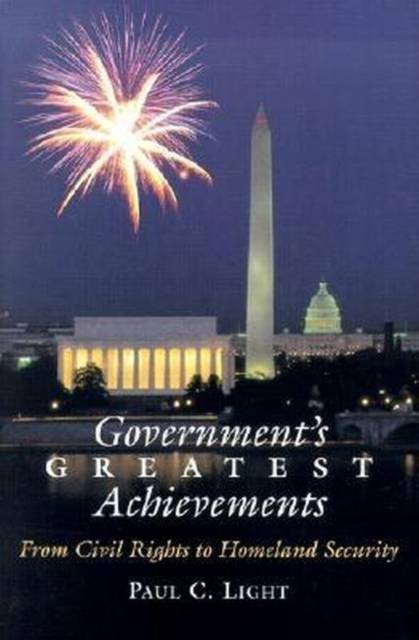
- Retrait gratuit dans votre magasin Club
- 7.000.000 titres dans notre catalogue
- Payer en toute sécurité
- Toujours un magasin près de chez vous
- Retrait gratuit dans votre magasin Club
- 7.000.0000 titres dans notre catalogue
- Payer en toute sécurité
- Toujours un magasin près de chez vous
Government's Greatest Achievements
From Civil Rights to Homeland Security
Paul C LightDescription
In an era of promises to create smaller, more limited government, Americans often forget that the federal government has amassed an extraordinary record of successes over the past half century. Despite seemingly insurmountable odds, it helped rebuild Europe after World War II, conquered polio and other life-threatening diseases, faced down communism, attacked racial discrimination, reduced poverty among the elderly, and put men on the moon. In Government's Greatest Achievements, Paul C. Light explores the federal government's most successful accomplishments over the previous five decades and anticipates the most significant challenges of the next half century. While some successes have come through major legislation such as the 1965 Medicare Act, or large-scale efforts like the Apollo space program, most have been achieved through collections of smaller, often unheralded statutes. Drawing on survey responses from 230 historians and 220 political scientists at colleges and universities nationwide, Light ranks and summarizes the fifty greatest government achievements from 1944 to 1999. The achievements were ranked based on difficulty, importance, and degree of success. Through a series of twenty vignettes, he paints a vivid picture of the most intense government efforts to improve the quality of life both at home and abroad--from enhancing health care and workplace safety, to expanding home ownership, to improving education, to protecting endangered species, to strengthening the national defense. The book also examines how Americans perceive government's greatest achievements, and reveals what they consider to be its most significant failures. America is now calling on the government to resolve another complex, difficult problem: the defeat of terrorism. Light concludes by discussing this enormous task, as well as government's other greatest priorities for the next fifty years.
Spécifications
Parties prenantes
- Auteur(s) :
- Editeur:
Contenu
- Nombre de pages :
- 200
- Langue:
- Anglais
Caractéristiques
- EAN:
- 9780815706045
- Date de parution :
- 23-07-02
- Format:
- Livre relié
- Format numérique:
- Genaaid
- Dimensions :
- 156 mm x 235 mm
- Poids :
- 585 g

Les avis
Nous publions uniquement les avis qui respectent les conditions requises. Consultez nos conditions pour les avis.






